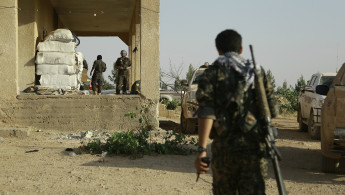Anthony Loyd was seized along with photographer Jack Hill in 2014 as they were returning to Turkey after several days working in the conflict zone of Aleppo.
Loyd was shot twice in the leg while being held captive and both men suffered severe beatings after Hill and the guide tried to escape.
However, Loyd said he recently saw his shooter, whom he named as Hakim Abu Jamal, in a video waving around a Kalashnikov gun while celebrating a US-backed rebel group victory in the border town of al-Rai.
"It was with some surprise watching a video of a victorious band of western-backed rebels that I noticed the face of America's newest ally in the war against Isis in Syria," he wrote in Saturday's Times.
"It was the face of a man I last saw in May 2014 when he leant forward to shoot me twice in the left ankle at almost point-blank range while my hands were tied," he added.
"He shot me in the middle of a crowd of onlookers, after a savage preliminary beating, denouncing me as 'a CIA spy'. Now, it seems, he works with them," he added.
Loyd was hooded and tied up and put in the back seat of a car, while Hill and the guide were put in the boot before being driven to a warehouse in the town of Tall Rifat.
Hill and the guide managed to break out and overpower their main captor. The guide escaped but Hill was recaptured and beaten, and Loyd was shot to stop him trying to leave.
He said Jamal was the ringleader of the gang, who hoped to secure a kidnap bounty from the two men, and criticised the CIA's vetting process.
"Centcom, the US Central Command, did not respond to Times requests over three days this week to explain how such a well-known hostage taker with family connections to extremists could have passed US vetting procedures," he wrote.
Reporters Without Borders says Syria is the most dangerous place in the world for journalists, with more than 110 killed since the conflict began in March 2011.





 Follow the Middle East's top stories in English at The New Arab on Google News
Follow the Middle East's top stories in English at The New Arab on Google News
![Israeli forces ordered bombed Gaza's Jabalia, ordering residents to leave [Getty]](/sites/default/files/styles/image_330x185/public/2176418030.jpeg?h=a5f2f23a&itok=_YGZaP1z)

